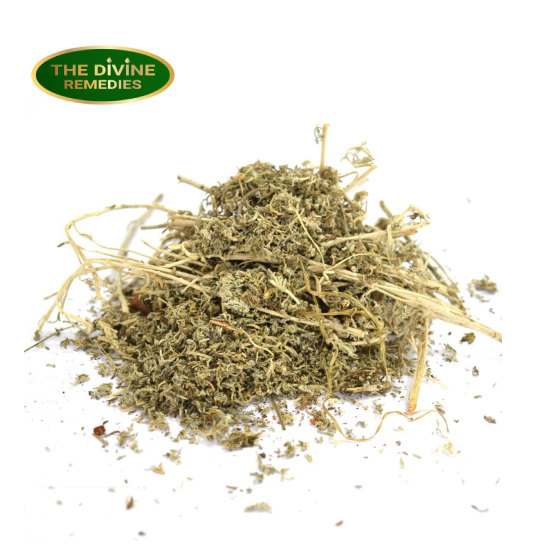
- Stock: In Stock
- Model: Marikozhundhu
- Weight: 100.00g
Tamil Name - மரிகொழுந்து
The davana plant is a small and aromatic herbaceous plant which is native to the Southern part of India, especially to the states of Karnataka,Tamil Nadu and Andhra Pradesh. It is also known by its botanical name of Artemisia Pallens. In the regional languages of the south, the davana is known by several names as "davanam" in Tamil, "davanamu" in Telugu and "davana" in Kannada. Its leaves and flowers are highly valued in the making of floral decorations and oils.
Belonging to the daisy family, the davana plant is around 40-60 metres in height with bluish green leaves and small yellow flowers. Its most valuable by-product is the davana oil. This annual south Indian plant generally grows near sandalwood trees and is charachterized by a fruity fragrance and freshness. The highly priced davana oil has not found much popularity in India. It is largely exported to various countries like France, USA, Germany, Japan and The Netherlands. In the mid 20th century, the plant had created a stir among perfumers in the West and it started to be commercially cultivated from the 1970s onwards. This plant is rarely grown in the wild as its seeds are small with delicate seedlings which require extreme care and nurture and so the plant is cultivated mostly in gardens and fields.
Uses
Digestive benefits
To enhance the digestive system's performance, 2-4 cups of marjoram tea may be ingested in 2 hours. Drinking the tea will help digestion by:
Increasing the efficiency of digestion by increasing digestive enzymes and saliva
Calming the stomach and digestive system.
Improving appetite
Relieving nausea
Eliminating flatulence
Curing or preventing basic intestinal infections
Soothing painful stomach cramps or spasms
Relieving diarrhea
Relieving constipation
Protection against common illnesses
Marjoram is a great antiseptic, antibacterial, antifungal, and antiviral agent. As a result, it fights against a variety of common illnesses:
Food poisoning
Staph infection
Tetanous infection in wounds
Typhoid
Malaria
Influenza
Common cold
Mumps
Measles
Improved cardiovascular health
Another benefit of marjoram is the enhancement of the cardiovascular and circulatory system. It helps by eliminating common risks associated with cardiovascular disease. Some ways it helps include:
Lowering the blood pressure, greatly reducing the risk of hypertension and resultant heart problems.
Greatly preventing the buildup of cholesterol, reducing risk of hardened arteries
Aiding in improved blood circulation by dilating the arteries as necessary.
Studies show that lower cholesterol and blood pressure levels are linked to a reduced rate of heart disease and heart attack.
Anti-inflammatory effects
Marjoram is also an anti-inflammatory herb. Taken internally, it is great at relieving a variety of problems caused by inflammation, including:
Asthma
Muscle spasms
Sinus headaches
Migraines
Fever
Body aches
Topical Application
Applied topically, it also has been known to relieve:
Painful joints
Sore muscles
Sprains
Back ache
Toothaches.
Emotional and Neurological Benefits
With sedative and antidepressant qualities marjoram has a variety of psychological and neurological benefits. It aids in:
Relieving insomnia
Reducing stress
Calming anxiety
Minimizing emotional reactions
Increasing control of sexual desire
When taken in larger doses, it even exhibits mild antidepressant qualities.
Other health benefits
There are a variety of other health benefits as well, such as:
Reduction of phlegm
Warding off fungal infections
Regulating the menstrual cycle in women
Relieving premenstrual syndrome (PMS)
Lessening bruising.
Some Suggestions for Use
Marjoram Tea: Grind marjoram leaves into a paste and add hot water or tea. Use one teaspoon of ground marjoram per 7 ounces of water. Boil the mixture for 15 minutes. Drink two to four cups of this tea over the span of two hours for digestive benefits.
Stronger marjoram tea: Add two teaspoons of marjoram to a cup of 7 ounces of cold water. Let it soak for 24 hours and add honey to it. An even stronger tea may be made by adding 6 teaspoons marjoram to 7 ounces of water. It has a calming, antidepressive effect.
Marjoram essential oil: The oil may be rubbed into the skin to relieve cramps, sprains, toothache, or other ailments.
Unlimited Blocks, Tabs or Accordions with any HTML content can be assigned to any individual product or to certain groups of products, like entire categories, brands, products with specific options, attributes, price range, etc. You can indicate any criteria via the advanced product assignment mechanism and only those products matching your criteria will display the modules.
Also, any module can be selectively activated per device (desktop/tablet/phone), customer login status and other criteria. Imagine the possibilities.
